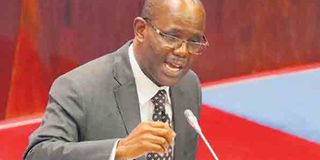Rahco, TRL merged to form new corporation

The Minister for Works, Transport and Communications, Prof Makame Mbarawa, responds to questions from lawmakers in Parliament in Dodoma on Wednesday. PHOTO | EDWIN MJWAHUZI
What you need to know:
The proposed law also dictates that any person who boards a train without having a ticket should be penalised by paying 100 per cent of the respective fare.
Dodoma. Parliament has passed the Railways Bill 2017 which proposes the formation of the Tanzania Railways Corporation (TRC) that will handle railways infrastructure development and operations.
The proposed law also dictates that any person who boards a train without having a ticket should be penalised by paying 100 per cent of the respective fare.
Currently, Reli Assets Holding Company (Rahco) is responsible for the railway infrastructure development and Tanzania Railway Limited (TRL) deals with train operations.
The proposed law states that TRC will replace the two, according to the Minister for Works, Transport and Communications, Prof Makame Mbarawa, who tabled the Bill on Wednesday, September 2017.
If assented, the new law will replace the Railways Act of 2002.
Rahco and TRL debts and assets will be carried by the new corporation while their staff will be shifted to other government institutions.
According to Prof Mbarawa, TRL has over 1,900 workers while Rahco has only 38. Merging the two organisation has been a demand by lawmakers who wanted all matters related to railways be done by one institution.
The changes also come as Tanzania is gearing up efforts to construct standard gauge railway in the central railway line. MPs now want the proposed TRC to work commercially and hire people who will help it achieve the business goals.
Mr Hussein Bashe (Nzega Urban-CCM) said as much as the new corporation sought to do business, there was no specific clause in the Bill that clearly stipulated that it should generate profits.
“I propose that we add such a clause in the proposed law to make it a serious commercial entity. In composing the board of TRC, I suggest the law should also allow hiring one member from the private sector to bring the commercial sense in the operations and do away with business as usual,” said Mr Bshe. He also suggested that TRC be allowed to borrow money from external sources to construct the proposed standard gauge railway instead of using the local money.
“Using little government money from domestic sources to buy aircraft, construct the modern standard gauge railway and build power generating plants which appears for political reasons will suffocate this economy,” he added.
MPs who contributed to the Bill mainly defected from specific clauses and express their concerns about the demolitions conducted along the railways. “You have been demolishing houses and other properties in areas you call railway reserve areas but it’s time the affected people were considered for compensation,” said Ms Magdalena Sakaya (Kaliua-CUF).
“In Nzega, about 500 houses are to demolished but if you thoroughly evaluate, most of the residents are old and have been living there for about 50 years,” said Mr Bashe. Mr Japhary Michael (Moshi Urban-Chadema) wanted the government to also consider compensation and take to task public officials on double title deeds.
“In Moshi, there is an area owned by the municipal council which is also supposed to be demolished. Now, I wonder who issued the title deed to the council while the area was part of the railway reserve,” he said.
He warned the government institutions to work together in the railways development and avoid unnecessary demolitions.




